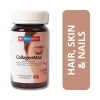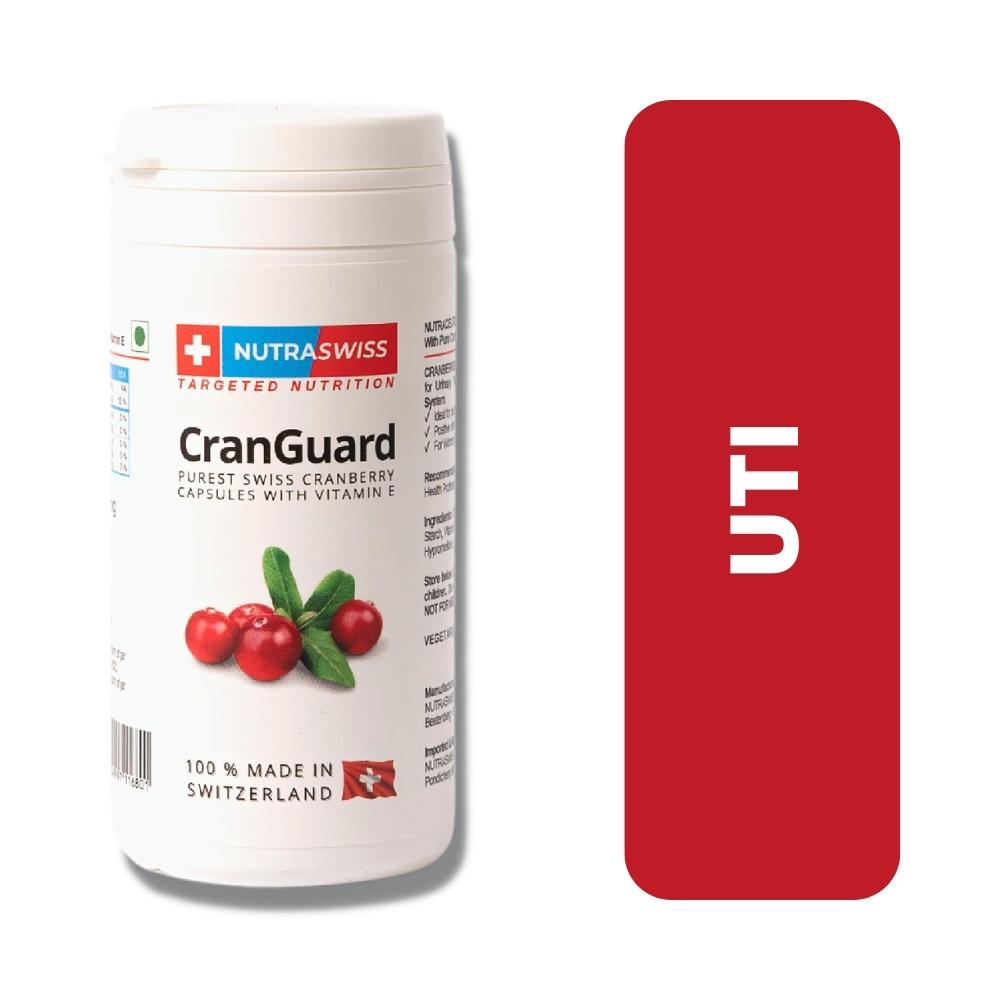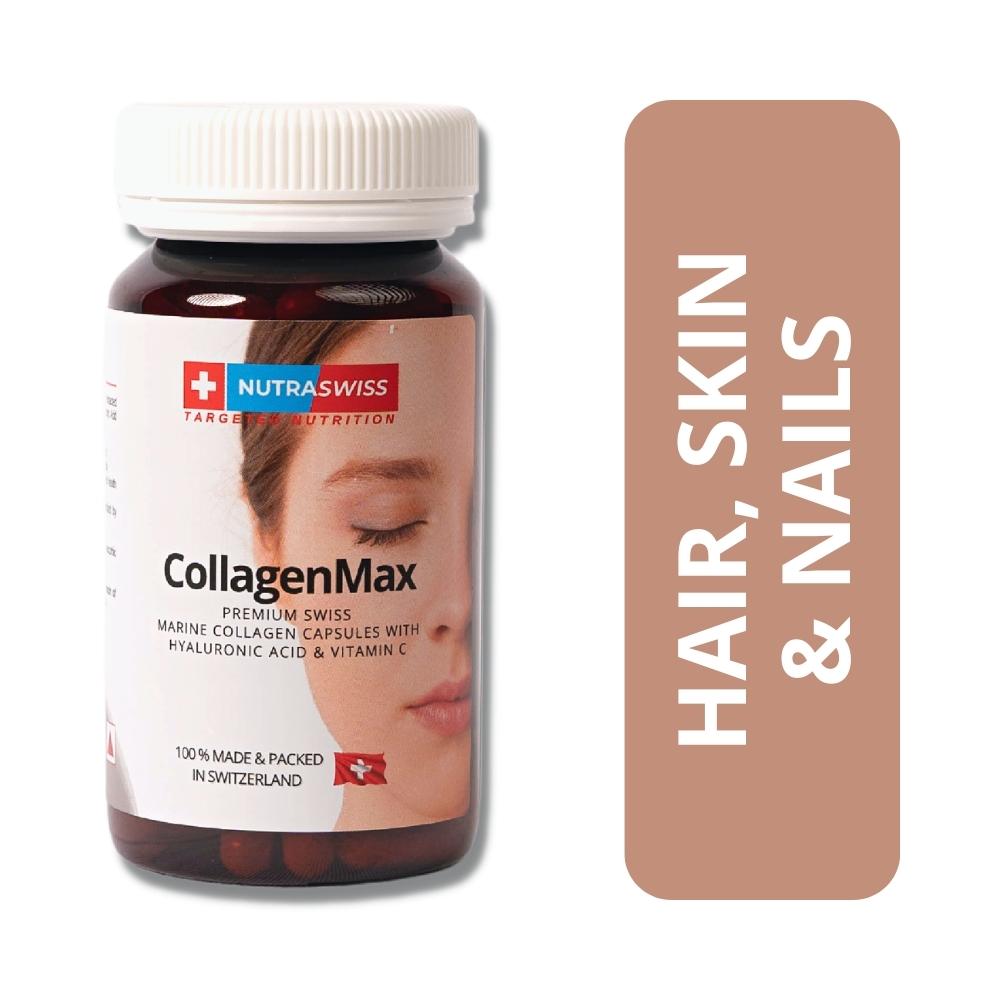ProbioMax® 50 Billion CFU+ Capsules for Gut Health
₹ 2409 excl. GST
Premium Swiss Probiotic Capsules (Pack Size: 60)
PREMIUM SWISS PROBIOTIC CAPSULES WITH LIVE LACTIC ACID BACTERIA
100 % MADE & PACKED IN SWITZERLAND!
_____________________
ProbioMax® helps balance the Friendly Bacteria in your Digestive System, can help prevent and treat Diarrhea, support Intestinal Functioning and strengthen the Intestinal Wall Barrier.
- With three different Living Lactic Acid Bacteria
- Substances for a Healthy Flora of the intestine
- Supports Digestion and the Immune System
Recommended dosage: 2 Capsules daily or as prescribed by Health Professionals
Main Ingredients: Yogurt Powder, Inulin, Freeze-Dried Lactic Acid Bacteria (Lactobacillus acidophilus (> 200 x 109 cfu/g), Lactobacillus delbrueckii bulgaricus (50 billion cfu/g), Bifibacterium bifidum (50 billion cfu/g), Maltodextrin), Fennel Extract (Foeniculum vulgare)
Disclaimer: To be stored under refrigeration and out of reach of children.
VEGETARIAN • GLUTEN-FREE
60 Capsules x 455 mg | 27.3 g net
_____________________
Increasingly large numbers of people suffer from gastrointestinal and digestive problems. The most common disorders include Bloating, Diarrhea, Heartburn, Reflux & Constipation. Digestive problems are very distressing. Luckily, nature offers a remedy to counteract these problems.
NUTRASWISS® has developed ProbioMax® Capsules with live and specially cultured bacteria which reproduce in the intestines and have a beneficial health effect by improving the Intestinal Microflora. With ProbioMax, NUTRASWISS offers a tried-and-tested Probiotic that Optimally Promotes Digestion and All-Round Health & Well-being.
_____________________
Health Benefits of Probiotics
The bacteria in your body are said to outnumber your body’s cells at a 10-to-1 ratio. According to these estimates, you have 39–300 trillion bacteria living inside you. Whichever estimate is most accurate, it’s certainly a large number. Much of these bacteria reside in your gut, and the majority are quite harmless. Some are helpful, and a small number can cause disease. Having the right gut bacteria has been linked to numerous health benefits, including the following:
- weight loss
- improved digestion
- enhanced immune function
- healthier skin
- reduced risk of some diseases
Probiotics, which are a certain type of friendly bacteria, provide health benefits when eaten. They’re often taken as supplements that are supposed to help colonize your gut with good microorganisms.
What are Probiotics?
Probiotics are living microorganisms that, when ingested, provide a health benefit. Probiotics are usually bacteria, but certain types of yeasts can also function as probiotics. There are also other microorganisms in the gut that are being studied, including viruses, fungi, archaea, and helminths. You can get probiotics from supplements, as well as from foods prepared by bacterial fermentation. Probiotic foods include yogurt, kefir, sauerkraut, tempeh, and kimchi. Probiotics should not be confused with prebiotics, which are carbs — often dietary fibers — that help feed the friendly bacteria already in your gut. Products that contain both prebiotics and probiotics are referred to as synbiotics. Synbiotic products usually combine friendly bacteria along with some food for the bacteria to eat (the prebiotics), all in one supplement. The most common probiotic bacteria are Lactobacillus and Bifidobacteria. Other common kinds are Saccharomyces, Streptococcus, Enterococcus, Escherichia, and Bacillus. Each genus comprises different species, and each species has many strains. On labels, you’ll see probiotics identified by their specific strain (which includes the genus), the species, subspecies if there is one, and a letter-number strain code. Different probiotics have been found to address different health conditions. Therefore, choosing the right type — or types — of probiotics is essential. Some supplements, known as broad-spectrum probiotics or multi-probiotics, combine different species in the same product.
Importance of Microorganisms for Your Gut
The complex community of microorganisms in your gut is called the gut flora, gut microbiota, or gut microbiome. The gut microbiota includes bacteria, viruses, fungi, archaea, and helminths — with bacteria comprising the vast majority. Your gut is home to a complex eco-system of 300–500 bacterial species. Most of the gut flora is found in your colon, or large intestine, which is the last part of your digestive tract. Surprisingly, the metabolic activities of your gut flora resemble those of an organ. For this reason, some scientists refer to the gut flora as the “forgotten organ”. Your gut flora performs many important health functions. It manufactures vitamins, including vitamin K and some of the B vitamins. It also turns fibers into short-chain fats like butyrate, propionate, and acetate, which feed your gut wall and perform many metabolic functions. These fats also stimulate your immune system and strengthen your gut wall. This can help prevent unwanted substances from entering your body and provoking an immune response. Your gut flora is highly sensitive to your diet, and studies show that an unbalanced gut flora is linked to numerous diseases. These diseases are thought to include obesity, type 2 diabetes, metabolic syndrome, heart disease, colorectal cancer, Alzheimer’s, and depression. Probiotics and prebiotic fibers can help correct this balance, ensuring that your “forgotten organ” is functioning optimally.
Impact On Digestive Health
Probiotics are widely researched for their effects on digestive health. Evidence suggests that probiotic supplements can help cure antibiotic-associated diarrhea. When people take antibiotics, especially for long periods of time, they often experience diarrhea — even long after the infection has been eradicated. This is because the antibiotics kill many of the natural bacteria in your gut, which shifts the gut balance and allows harmful bacteria to thrive. Probiotics may also help combat irritable bowel syndrome (IBS), a common digestive disorder, reducing gas, bloating, constipation, diarrhea, and other symptoms. Research regarding the effectiveness of probiotics supplementation for the treatment of IBS is mixed. A recent review reported that seven of the studies indicated IBS improvement with probiotic supplementation, but four did not. Research indicates that multi-strain probiotic supplements seem to bring most IBS improvement, especially when taken for longer than 8 weeks. However, much remains unknown about probiotic treatment for IBS. Questions like the following have yet to be answered:
- Which IBS symptoms improve with probiotics?
- Which probiotics, or probiotic mixtures, are most effective?
- What dosages and durations of probiotic treatments are best?
- Do different types of IBS require different probiotic treatments?
Researchers find early results of IBS probiotic treatment promising but say additional large trials are necessary before healthcare providers can confidently prescribe probiotic treatments consistently for IBS. Some studies also note benefits of probiotic supplementation against inflammatory bowel diseases, such as Crohn’s disease and ulcerative colitis. Probiotics may also help fight Helicobacter pylori infections, which are one of the main drivers of ulcers and stomach cancer. If you currently have digestive problems that you can’t seem to vanquish, a probiotic supplement may be something to consider. However, be sure to consult your healthcare provider first.
Impact On Weight Loss
Some research indicates that people with obesity have different gut bacteria than those who are lean. Research shows a connection between gut microbes and obesity in both infants and adults. It also shows that microbial changes in the gut are a factor in developing obesity as an adult. Therefore, many scientists believe that your gut bacteria are important in determining body weight. In one study, 210 people with central obesity, which is characterized by excess belly fat, took the probiotic Lactobacillus gasseri daily. Participants lost an average of approximately 8.5 % of their belly fat over 12 weeks. When participants stopped taking the probiotic, they gained the belly fat back within 4 weeks. Evidence also suggests that Lactobacillus rhamnosus and Bifidobacterium lactis can aid weight loss and help prevent obesity.
The Rise Of Psychobiotics
In the past decade, research has shown that the gut and brain are connected in a system called the gut-brain axis. This axis links the body’s central and enteric nervous systems, the latter of which governs digestion. Some research shows that certain microbes in the gut can affect your brain via this axis in both health and disease. These bacteria are part of an emerging field called “psychobiotics”. Research indicates that psychobiotics can help treat cognitive and neurological disorders, such as autism, Alzheimer’s disease, and Parkinson’s disease. Which microbes these are and how they interact with the brain is the subject of much current research.
Some researchers suggest that, for some people, supplementing with certain strains of probiotics may be preferable to taking psychotropic drugs to cope with the mental stress, loneliness, and grief accompanying the current COVID-19 pandemic.
Other Health Benefits
There are many other benefits of probiotics. They may help with the following conditions:
- Inflammation: Probiotics reduce systemic inflammation, a leading driver of many diseases.
- Depression and anxiety: The probiotic strains Lactobacillus helveticus and Bifidobacterium longum have been shown to reduce symptoms of anxiety and depression in people with clinical depression.
- Blood cholesterol: Several probiotics have been shown to lower total and LDL (bad) cholesterol levels, although the research remains controversial.
- Blood pressure: Probiotics may also cause modest reductions in blood pressure.
- Immune function: Several probiotic strains may enhance immune function, possibly leading to a reduced risk of infections, including those that cause the common cold.
- Skin health: There’s some evidence that probiotics can be useful for acne, rosacea, and eczema, as well as other skin disorders.
- Anti-aging: Though research is extremely limited, there’s evidence that probiotics have the potential to extend lifespan by increasing the ability of cells to replicate themselves.
This is only a small slice of probiotics’ benefits, as ongoing studies indicate a wide breadth of potential health effects.
COVID-19 & Probiotics
Some researchers propose that improving the gut microbiome via probiotic supplementation and diet may be a strategy to fight and treat an infection with the novel coronavirus SARS-CoV-2. This infection can cause COVID-19, which stands for coronavirus disease 2019. COVID-19 is known to damage the body’s immune defense through a “cytokine storm” of excessive inflammatory cytokines. This is believed to be the main cause of deteriorating health and even death. Because intestinal flora have been shown to strengthen the immune system and fight inflammation, researchers think probiotic supplements may help speed recovery from coronavirus by inhibiting or limiting this “cytokine storm”. Also, people with COVID-19 have reported gastrointestinal symptoms, such as diarrhea, nausea, vomiting, abdominal pain, and loss of appetite. Some researchers theorize that probiotics could help prevent the coronavirus by blocking the angiotensin-converting enzyme (ACE) receptor where the SARS-CoV-2 pathogen enters the body to invade gastrointestinal cells. Another proposed link between COVID-19 and probiotics involves what is called the “gut-lung axis.” This is a system of communication and interaction between the gut and lung tissues, which occurs via microorganisms of the human microbiome. Imbalances of the intestinal flora are known to be related to lung diseases and respiratory tract infections. Researchers suggest that correcting those imbalances may promote optimum lung health, which might help guard against pathogens like SARS-CoV-2. Other research suggests that probiotic supplementation may promote antiviral activity in general to improve immune, pulmonary, and anti-inflammatory response that might help clear the SARS-CoV-2 infection. All these hypotheses are at the theoretical stage. Researchers say further studies are needed to confirm them. One study advises caution, suggesting that not all probiotic strains will exert the same effects. It questions whether probiotic supplementation can alter the content of the gut microbiome enough to combat COVID-19.
The Bottom Line
Maintaining a healthy gut is about more than taking a probiotic supplement. Day-to-day diet and exercise are just as important, as many lifestyle factors affect your gut bacteria. However, probiotic supplements may offer a wide range of benefits with few side effects. As such, if you’re interested in improving your gut health, they could be worth a try. Be sure to talk to your healthcare provider first to make sure you’re trying the right strains in the right amounts and avoid any side effects.
_____________________
Manufactured & Packed in Switzerland by:
NUTRASWISS GmbH • Schmockenstrasse 129 • 3808 Beatenberg • Switzerland • info@nutraswiss.com
9 reviews for ProbioMax® 50 Billion CFU+ Capsules for Gut Health
Add a review Cancel reply
Related products
Premium Swiss Lutein Capsules (Pack Size: 100)
Premium Swiss Cranberry Capsules (Pack Size: 60)
Premium Swiss Q10 Capsules (Pack Size: 60)
Premium Swiss Melatonin Capsules (Pack Size: 30)
Premium Swiss Ginseng & Ginkgo Capsules (Pack Size: 60)
Premium Swiss Saw Palmetto Extract Capsules (Pack Size: 60)
Premium Swiss Marine Collagen Capsules (Pack Size: 120)














tlovertonet –
I like this website so much, saved to fav.
35.01hsvhc92fd7mzee8kz6230xfr@mail4u.run –
provident quasi fuga reiciendis recusandae nulla excepturi. eum et eos fugit.
vishnu singh –
Expensive but amazing results! The results of these tablets were within 1-2 weeks of using them. They are more expensive than other ones, but they are also more effective.
S. Gautam –
Especially the effect is amazing and to emphasize that you also notice how the air disappears from the stomach.The taste is neutral since its a capsule. The price is fair.If I have seen correctly it is manufactured in Switzerland.
Kannan Srinivas –
pleasant digestion of food!
Deepak –
Good product
Pradeep B –
Suffering long time from stomach issues..but have seen great progress after PROBIOMAX. Very powerful product from Switzerland but price is high. Company should take steps to reduce price for common man.
Ashok –
Super
Ajay –
Loved this one! Did wonders for my gut health..